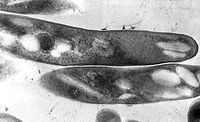
Photo from wikipedia
Background: Rapidly growing mycobacteria (RGM) are a group of nontuberculous mycobacteria (NTM) implicated in difficult-to-treat pulmonary and extrapulmonary diseases, possibly associated with invasive procedures and failures in sterilization of materials… Click to show full abstract
Background: Rapidly growing mycobacteria (RGM) are a group of nontuberculous mycobacteria (NTM) implicated in difficult-to-treat pulmonary and extrapulmonary diseases, possibly associated with invasive procedures and failures in sterilization of materials and equipment. Methods: We report our experience with the laboratory identification of RGM in a routine work and give an overview of the RGM isolated in our setting. Laboratorial data from all RGM mycobacterial isolates received at Adolfo Lutz Institute of São José do Rio Preto were analyzed from January 2000 to December 2015. Results: Five hundred and seventy-nine isolates were identified with NTM, of which 193 were RGM, which affected 113 patients. Among the 113 patients, the female gender was more frequent (55%) and the average age was 50 years. Pulmonary samples were the most frequent (79%), and 54.9% of the cases were isolated from sputum. Twelve different species were found and the most identified were group Mycobacterium abscessus and Mycobacterium fortuitum, making up 77.9% of all identified RGM. The most frequent comorbidities were smoking (n = 21), alcoholism (n = 12), and human immunodeficiency virus (n = 16). Drug susceptibility test was performed for nine patients and all showed susceptibility to amikacin and seven resistances to doxycycline. Conclusions: This study showed the experience of mycobacterial diagnosis in a routine laboratory, revealing that failure to meet the bacteriological criteria generates losses in the establishment of cases of RGM and consequently its correct treatment.
Journal Title: International Journal of Mycobacteriology
Year Published: 2021
Link to full text (if available)
Share on Social Media: Sign Up to like & get
recommendations!